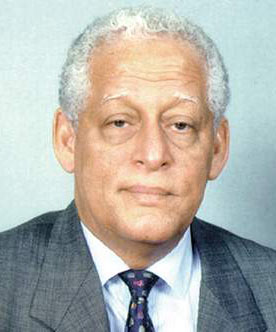The Government has remembered late former Caribbean Community (CARICOM) Secretary-General, Sir Meredith Alister McIntyre as one of the region’s “most illustrious sons,” whose yeoman service included serving as the first Good Officer of the United Nations Secretary-General for the Guyana-Venezuela border controversy.
“To the Region that nurtured him, in turn, he gave his life in selfless service and dedication, an invaluable contribution to the goal of the integration of its peoples and countries, in which he truly believed,” the Ministry of Foreign Affairs said in a statement issued yesterday.
Sir Alister, who was born in St. Georges, Grenada, served as CARICOM Secretary-General from 1974 to 1977. He died last Saturday in Jamaica. He was 87.
The statement noted that Sir Alister served with distinction as Good Officer to resolve the controversy. It also credited his taking the opportunity of his posting to Georgetown as the CARICOM Secretary-General to acquaint himself with Guyana’s politics as helping him to acquit himself well in his assignment as Good Officer. His tenure ended in 1999.
The statement further said that in 1975, he assisted the Government of Guyana in its quest to transform the economy. Along with William Demas, it explained, Sir Alister served as adviser to the Restructuring Committee that had been mandated to plan that transformation and, in 1977, produced a report edited by the late Haslyn Parris. The State Planning Act was subsequently passed in Parliament.
Additionally, in 1980, the ministry said, Sir Alister, with a team including renowned Canadian Professor Gerry Helleiner, produced a report on Guyana’s Economic Recovery Programme, setting out to explain why such a radical economic programme was required, its key elements and alternative options.
Before his appointment as UN Good Officer, the ministry noted that Sir Alister also served the United Nations system as Director of the Commodities Division of the United Nations Conference on Trade and Development (UNCTAD) as well as Deputy Secretary-General of that body. He also later served as Assistant Secretary-General in the Office of the Director General for International Economic Cooperation at United Nations Headquarters.
According to the statement, as an academic, Sir Alister gave yeoman service to the University of the West Indies (UWI), where he lectured before becoming, in 1967, the Director of the Institute of Social and Economic Research. He also served as an Assistant Professor at both Princeton and Columbia University. In 1988, he was appointed Vice-Chancellor of the UWI, a post that he held until his retirement in 1998.
The ministry also noted that Sir Alister was one of the three-member team of eminent Caribbean scholars that was appointed by CARICOM Heads of Government in 1990 to examine the state of regional integration, and the ensuing report — A Time for Action — in 1991, arguably began a process of regional introspection that resulted in the Revised Treaty of Chaguaramas in 2001. This established the Caribbean Single Market and Economy (CSME).
The statement also highlighted the work done by Sir Alister, as Chief Technical Adviser, along with Sir Shridath Ramphal, to lay the foundations for the Regional Negotiating Machinery, which it called the region’s “best known and most formidable negotiating apparatuses,” and a model for other developing countries/ regions.
Sir Alister’s numerous honours included being awarded the Order of the Caribbean Community (OCC), the Order of Merit (OM) of the Government of Jamaica, the Cacique Crown of Honour (CCH) of the Government of Guyana, and Knighthood by the Queen of England.






